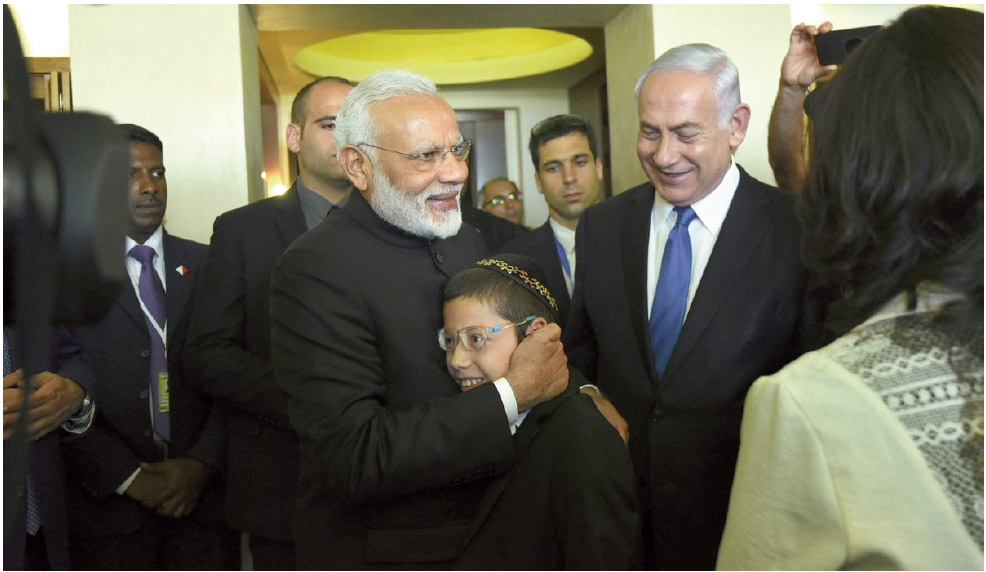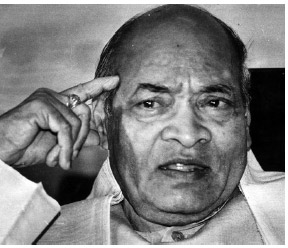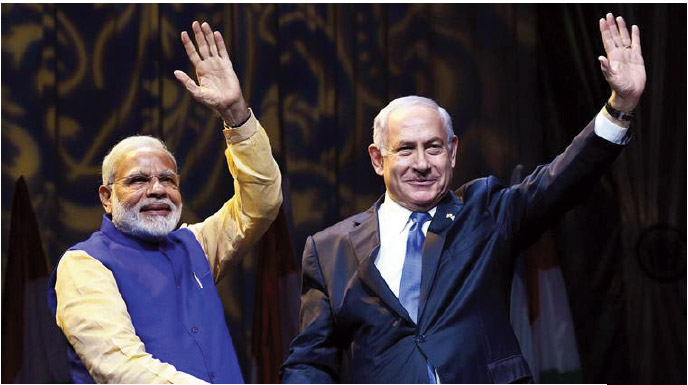Changing global realities
Importance of "strategic relationship" with Israel
 Hari Jaisingh
Hari Jaisingh
 Emotional moment when Prime Minister Narendra Modi met 11-year-old Moshe who lost both his parents in the
2008 Mumbai attack.
Emotional moment when Prime Minister Narendra Modi met 11-year-old Moshe who lost both his parents in the
2008 Mumbai attack.
Prime Minister Narendra
Modi's warm hug picture
with 11-year-old boy
Heltzberg Moshe in
Jerusalem symbolically
signifies India Israel new
'strategic- relationship with a human
touch. Moshe's Jewish parents in Mumbai were killed during the
Pakistan-sponsored 26/11 terror
attack in India's commercial capital.
Having survived miraculously the
terror attack, Moshe, then just two
years old, thereafter traveled with his
grandparents to Afula where he now
lives.
More than the warmth and
courtesies extended to our Prime
Minister by Israeli leaders and
people, young Moshe holds out a
mirror of the 26/11 bloody chapter
of Indian history and related
geopolitical realities of Pakistan and
China woven around it. Indian
developments since Independence
remind us of the bitter truth that we as a people are poor learners of history.
Small wonder that India's has been
a saga of tragic stories from the Oct
1947-48 Pakistani tribal invasion in
Kashmir to the 1962 Chinese betrayal
of the Panchsheel principle in NEFA to
Beijing's suppression of Tibetans and
their mass exodus from their beloved
country to Pak-sponsored Mumbai
terror strikes and beyond. We have
had to pay a heavy price for being a
'soft state'. It is time we come out of
this 'goody goody' mindset if we mean
to take India forward.
Narendra Modi has visited 60
countries in three years of
premiership. But for the first time he
has given a definite swing to the
Narendra Modi's three-day
trip to Tel Aviv was a major
departure from status quo
pursuit of India's foreign
policy during the past 70
years. Of course, P. V.
Narasimha Rao gets the
credit for establishing
diplomatic ties with Israel
25 yeas ago.
 Former Prime Minister
P. V. Narasimha Rao
conduct of India's diplomacy by
breaking the old mental barriers of
foreign policy in tune with our national
interest. He has walked on a new path
to reach out to Tel Aviv, which the old
political stalwarts dared not tread.
Here is the Prime Minister's pragmatic
foreign policy at its best. A major
achievement of this visit is the dehyphenation
of India's relations with
Israel and Palestine. This has been
criticized in India as abandoning the
Palestinian case. But the evidence on
the ground suggests otherwise. India's
traditional commitment to the
Palestinian cause remains undiluted.
And rightfully so, India must honour
this age-old commitment.
Former Prime Minister
P. V. Narasimha Rao
conduct of India's diplomacy by
breaking the old mental barriers of
foreign policy in tune with our national
interest. He has walked on a new path
to reach out to Tel Aviv, which the old
political stalwarts dared not tread.
Here is the Prime Minister's pragmatic
foreign policy at its best. A major
achievement of this visit is the dehyphenation
of India's relations with
Israel and Palestine. This has been
criticized in India as abandoning the
Palestinian case. But the evidence on
the ground suggests otherwise. India's
traditional commitment to the
Palestinian cause remains undiluted.
And rightfully so, India must honour
this age-old commitment.
Looking around the neighborhood
and changing global realities we
cannot ignore the security implications
of changing trends in the world. What
matters today is the right perspective that takes into account all facets of
internal and external threats so that GEOthe
country could evolve a credible
medium and long term views of its
goals and objectives in its pursuit of
strategic security and economic
policies.
 Prime Minister Modi with his Israeli counterpart Benjamin Netanyahu
during his recent visit to Israel.
Narendra Modi's three-day trip to
Tel Aviv was a major departure from
status quo pursuit of India's foreign
policy during the past 70 years. Of
course, P. V. Narasimha Rao gets the
credit for establishing diplomatic ties
with Israel 25 yeas ago. Still, South
Block was invariably extra cautious in
striking a balance act between Israel
and the Arab world, especially with
regard to Palestine. Narendra Modi is
the first Indian Prime Minister to go to
Tel Aviv without visiting Palestine while
broadly sticking to the same policy. He
has thereby given a powerful signal to
the global community of India's special
relationship with the Jewish state that
has survived amidst a hostile
atmosphere of the oil-rich West Asian
countries. How could Israel do it has
often tickled the curiosity of several
thinking Indians both within the
establishment and outside of it.
The Jewish brains are known for
their innovative technical and scientific
spirit and skills. They have made their
water-starved arid land bloom with
new water techniques in the farm and
horticulture sector. They have
quenched the thirst of the majority of people by the desalination technology
of the seawater. They have evolved a
unique military strategy with the
backup of very powerful weaponry
system on the land, in the air and the
sea. Small wonder that no enemy state
encircling dare touch it, whatever
might be its wealth and military
muscle.
Prime Minister Modi with his Israeli counterpart Benjamin Netanyahu
during his recent visit to Israel.
Narendra Modi's three-day trip to
Tel Aviv was a major departure from
status quo pursuit of India's foreign
policy during the past 70 years. Of
course, P. V. Narasimha Rao gets the
credit for establishing diplomatic ties
with Israel 25 yeas ago. Still, South
Block was invariably extra cautious in
striking a balance act between Israel
and the Arab world, especially with
regard to Palestine. Narendra Modi is
the first Indian Prime Minister to go to
Tel Aviv without visiting Palestine while
broadly sticking to the same policy. He
has thereby given a powerful signal to
the global community of India's special
relationship with the Jewish state that
has survived amidst a hostile
atmosphere of the oil-rich West Asian
countries. How could Israel do it has
often tickled the curiosity of several
thinking Indians both within the
establishment and outside of it.
The Jewish brains are known for
their innovative technical and scientific
spirit and skills. They have made their
water-starved arid land bloom with
new water techniques in the farm and
horticulture sector. They have
quenched the thirst of the majority of people by the desalination technology
of the seawater. They have evolved a
unique military strategy with the
backup of very powerful weaponry
system on the land, in the air and the
sea. Small wonder that no enemy state
encircling dare touch it, whatever
might be its wealth and military
muscle.
To boost bi-lateral trade
from $5 billion to $20
billion in five years, Indian
and Israeli companies
have signed strategic pacts
worth $4.3 billion. Even
$40 million innovation
fund has been set up, the
area where India lags
behind
Prime Minister Modi has been well
focused in correcting some of the
basic weaknesses India suffered for
decades in critical areas of security,
water and agriculture. He has signed
17 wide-ranging MOUs with the Israeli
government. These include industrial
R&D and technological innovation,
drinking water, sanitation, water
conservation, energy, agriculture,
space and atomic cooperation, GEO-LEO optical links. Tel Aviv will also help
New Delhi to conserve water and clean
up the Ganga.
To boost bi-lateral trade from $5
billion to $20 billion in five years,
Indian and Israeli companies have
signed strategic pacts worth $4.3
billion. Even $40 million innovation
fund has been set up, the area where
India lags behind. In fact, we ought to
make special efforts to create
congenial professional working
atmosphere to get the best out of
India's indigenous talent.
There is too much of political
interference in every sphere of public
life. Will Prime Minister Modi give a
serious thought to this matter, if he
means to learn from the Israeli and
Western success story? My point is
simple: if the Indians overseas could
become a big hit, why can't they be a
success in their own land? The answer
is simple: the country continues to
suffer from politico-bureaucratic
control mechanism, which kills the
people's innovative skills and
initiatives.
Be that as it may. The catch phrase
for Modi, as Indian Ambassador to
Israel Pawan Kapoor put it, was
defence development and "strategic
partnership" in areas of innovation,
science, technology and space. While
the relationship in these fields have
already been upswing for the past
several years, the new deals and
commercial agreements are set to
ramp up and upgrade the already
strong bi-lateral ties.
The Modi regime has worked
quietly in giving twists and turns to
Indian diplomacy, keeping in view the
need for bridging India's gaps in
defense and security needs. As it is,
India is faced with a barbaric face of
Pak-sponsored militancy in J&K and
beyond, for which this country has to
find new answers. Tel Aviv has the
expertise and target-based
technology, which can do wonders in
curbing the on-going menace of
terrorism from across the border.
Viewed in a larger framework, the
existing Indian system has to be jolted
out of its business-as-usual syndrome.
We have to look at our security needs
afresh against the backdrop of the
changing regional and global
environment, especially in the light of
the growing Beijing-Islamabad axis
and China's hostile postures at the
borders and the Indian Ocean. We
have also to constantly keep in mind
the tactics and strategies being
adopted by the Islamic fundamentalist
groups as part of Pakistan's gameplan.
Our strategic doctrine vis-à-vis
Pakistan and China needs drastic
revision. To think that any future conflict would be mere extrapolation
of our past experience could be
wrong. A long-term perspective
demands resilient diplomacy backed
up by sound economy and the ability
of our administrative structure and
political processes to command loyalty
of the people belonging to all sections
of society, Muslims included.
The Modi regime has
worked quietly in giving
twists and turns to Indian
diplomacy, keeping in
view the need for
bridging India's gaps in
defense and security
needs. As it is, India is
faced with a barbaric
face of Pak-sponsored
militancy in J&K and
beyond for which this
country has to find new
answers.
Ironically, China today talks about
Panchsheel, forgetting that it killed this
principle not only on the question of
Tibetan autonomy but also by its 1962
conflict. The problem with the Indian
leadership has been it has invariably
overlooked certain harsh facts of
Chinese history and its expansionist
policies whenever it happens to be
strong.
Prime Minister Modi has rightly
picked up the threads and made serious efforts to put the country's
defence in order. In this context, what
is needed, is a broad based national
institutions, which should draw the
best available talent and expertise in
specified areas of foreign policy,
geopolitics, economics and security
priorities with the objective of evolving
an integrated foreign policy within the
framework of global realities. The
country can no longer afford to go by
ad hoc reaction of its leaders who, as
past experience shows, often get
influenced by short-term political
considerations.
Besides, our thinking on security
must not be trapped in rigidity. It
needs to change with the changing
security needs.
In his book, "The Open Society and
its Enemies", Paul Popper writes:
"The future depends on ourselves
and we do not depend on any
historical necessity"
It is indeed for us what we want
ourselves to be, keeping in view the
nation's march forward.
There are no
shortcuts to the country's greatness
and our march forward mainly
depends on the political will of our
leaders at the helm. The CPM's
assertion that "the BJP led
government's alliance with Israel is a
reflection of its pro-imperialist,
Hindutva-oriented foreign policy" is
totally misplaced. We know the CPM
mind-set: What PM Modi has done is in
India's national security interest, which
has to be the primary responsibility of
any democratic government.
Israel is a shining example of how a
nation could keep its flag high even in
a highly hostile neighbourhood – the
sort of unfriendly atmosphere we are
faced with vis-à-vis Pakistan and China.
Apparently, South Block has to
correctly measure China's real
intentions and Pakistan's dubious goal
of grabbing Jammu & Kashmir by hook
or by crook. Here I wish to say in all
humility that in today's global
complexities and sophisticated
technological needs for our defence
and our economic strength, New Delhi
needs Tel Aviv more than what Israel
seeks from India as a 'Dost'.




 Hari Jaisingh
Hari Jaisingh Emotional moment when Prime Minister Narendra Modi met 11-year-old Moshe who lost both his parents in the
2008 Mumbai attack.
Emotional moment when Prime Minister Narendra Modi met 11-year-old Moshe who lost both his parents in the
2008 Mumbai attack. Former Prime Minister
P. V. Narasimha Rao
Former Prime Minister
P. V. Narasimha Rao Prime Minister Modi with his Israeli counterpart Benjamin Netanyahu
during his recent visit to Israel.
Prime Minister Modi with his Israeli counterpart Benjamin Netanyahu
during his recent visit to Israel.